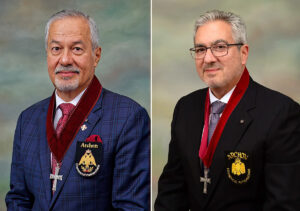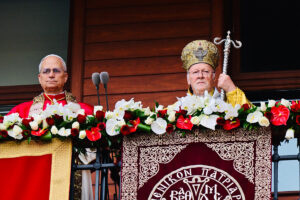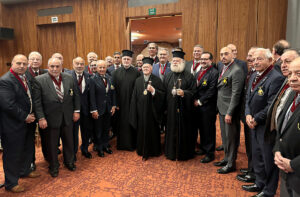There are around fifteen million Ahmadiyya Muslims worldwide, constituting around one percent of the world’s Muslim population. Around four million Ahmadiyya Muslims live in Pakistan.
“The persecution faced by the Ahmadiyya Muslim community in Pakistan,” by Robert Johnson, European Times, June 12, 2024:
Introduction For a period, the Ahmadiyya Muslim community in Pakistan has endured persecution and bias despite the constitutional assurance of religious freedom in the country. The situation has worsened recently, with extremist factions such as Tehrik-e-Labaik (TLP) stoking animosity and aggression towards the Ahmadis. The oppression has reached a point where many Ahmadis are obliged to flee Pakistan to ensure the safety of their families and practice their religion freely. Organizations like the International Human Rights Committee (IHRC) and the Coordination des Association et des Particulier pour la Liberté de Conscience (CAP-LC) have been actively raising awareness and advocating for the rights of the Ahmadiyya Muslim community.
The Role of Tehrik-e-Labaik in Persecuting Ahmadis In an incident documented by IHRC, a 16-17-year-old student named Syed Ali Raza, associated with a local Ahl-e-Sunnat Madrasa (Islamic school), was identified as the alleged perpetrator in the killing of two Ahmadiyya Muslims, Ghulam Sarwar and Rahat Ahmad Bajwah. The report also implicated Sajid Lateef, Chief Organizer of the Madrasa, as a figure engaged in targeting Ahmadis. This incident underscores how extremist groups like TLP are increasingly targeting and oppressing members of the Ahmadiyya community, forcing many to seek refuge in other countries.
TLP has been prominently involved in spreading anti-Ahmadi sentiments and perpetrating violence within Pakistan. The group has used their influence to push the government to take action against the Ahmadiyya Muslim, often resorting to protests and threats. This has created a climate of fear and intimidation for the Ahmadiyya Muslim community, leading many to live in seclusion or leave the country altogether.
There has been condemnation from organizations like IHRC and CAP-LC against the persecution of the Ahmadiyya Muslims in Pakistan. They are urging the international community to pressurize the government to safeguard the rights of the Ahmadiyya Muslim people and bring those responsible for these actions to justice. These organizations are calling on authorities to halt the TLP’s activities and align their laws with international standards as outlined in the International Covenant on Civil and Political Rights (ICCPR).
The struggles faced by the Ahmadiyya Muslim community in Pakistan have garnered attention worldwide, with human rights groups and religious leaders from various countries calling for action. CAP-LC and IHRC have been actively working towards raising awareness about the challenges encountered by the Ahmadiyya Muslims through campaigns, conferences, and advocacy initiatives.
During a conference organized by CAP-LC and IHRC, religious leaders deliberated on protecting freedom of religion and belief for all individuals. The participants at the conference emphasized safeguarding the rights of minorities and holding governments accountable for their actions.
Pakistan’s inability to safeguard the Ahmadiyya Muslims and fulfill its international responsibilities remains a pressing issue despite attempts to address it. The government’s failure to shield the Ahmadiyya Muslim community and its role in mistreating minority groups stain its reputation and go against its commitments. It is imperative for the world not to remain silent in the face of these violations of dignity and the sanctity of life.
The Universal Declaration of Human Rights, Article 18, affirms that “Everyone has the right to freedom of thought, conscience, and religion; this right includes freedom to change his religion or belief, and freedom, either alone or in community with others and in public or private, to manifest his religion or belief in teaching, practice, worship, and observance.” Unfortunately, in Pakistan, members of the Ahmadiyya Muslim community are deprived of this right, leading many to seek refuge in other countries to practice their faith freely and ensure their safety.
Various international bodies, such as the United Nations and global human rights organizations, have consistently raised alarms about the mistreatment of the Ahmadiyya Muslims in Pakistan. Recently, on July 13, 2021, UN human rights experts expressed concerns about the ongoing human rights abuses suffered by the Ahmadiyya Muslims worldwide. They urged the international community to intensify efforts to halt the persecution faced by Ahmadis.
The Lahore High Court Bar Association issues a directive that demands attention. Amid the crisis, the Lahore High Court Bar Association has taken a concerning step by instructing police officials to take legal action against Ahmadi Muslims who gather, observe, and pray during Muslim Eid festivities. Referring to laws that designate Ahmadis as “Non-Muslims” and using inflammatory language, the lawyers’ association has aligned with views similar to those of radical Mullahs and Clerics who have incited violence recently.
This directive from the Bar Association is viewed as another effort to justify the persecution of Ahmadis and deny them their right to practice their beliefs. Dr. Aaron Rhodes, President of the Forum for Religious Freedom-Europe, has condemned this action as “shocking” and called on bar associations worldwide to encourage their counterparts to combat religious intolerance and violence.






